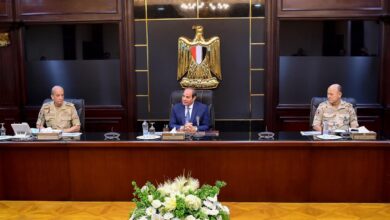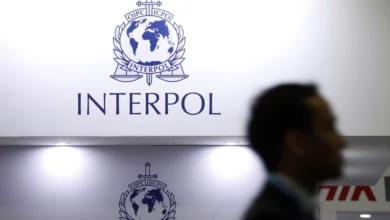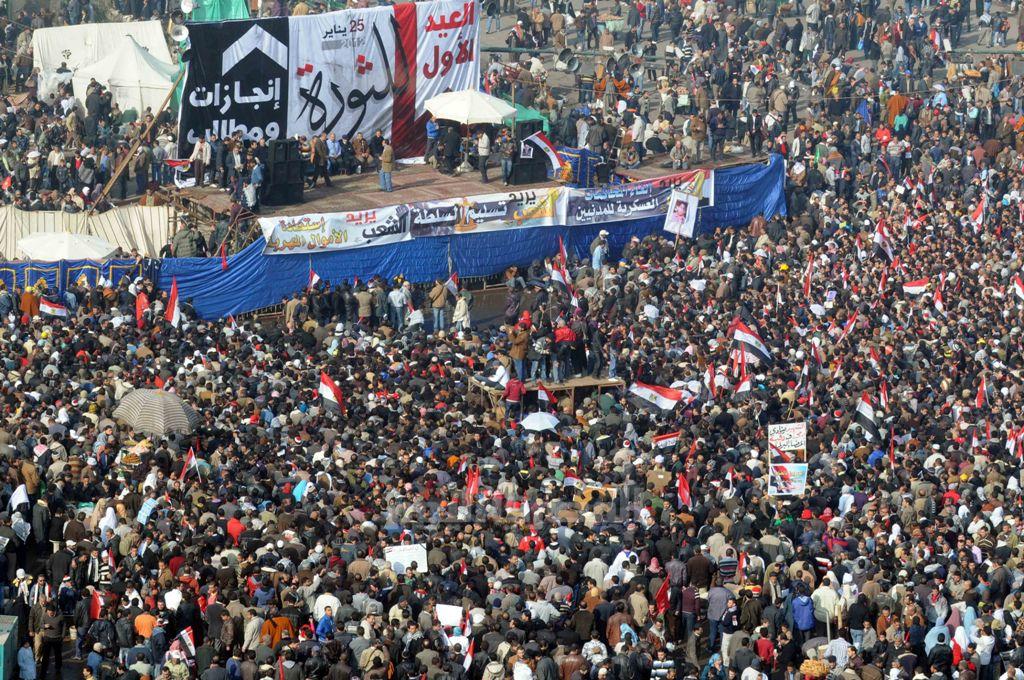In his first visit to Egypt since unrest broke out in January, the Executive Director of Human Rights Watch, Kenneth Roth, said the revolution has not yet ended. He said Egypt has become more open than ever before, though the military junta that runs the country lacks experience in dealing with human rights organizations and rejects any criticism for fear of losing people's confidence.
Roth said that the Supreme Council of the Armed Forces (SCAF) did not acknowledge conducting virginity tests on female protesters, but vowed that this act will not happen in the future even with any prisoners.
He called on the SCAF to listen to people, saying Mubarak's belief that he had all the answers and his refusal to listen was behind his downfall.
Al-Masry Al-Youm: First, what is the difference between this visit and your previous visits to Egypt?
Roth: My first visit to Egypt as an official at Human Rights Watch was 20 years ago. The aim of the visit was to talk about the torture practiced by the State Security Apparatus against the detainees. I tried to hold a press conference at a hotel in Cairo, but the State Security Apparatus refused, so I had to invite journalists to my room, and this was the only way to talk about the issue. Today, it is different; I hold a press conference at the Journalists Syndicate.
Al-Masry: What is the aim of your visit this time and who did you meet?
Roth: I spent the last few days in meetings with senior officials, including the minister of justice, assistant secretary of the interior minister and more importantly, the military junta that now runs the country, and we hope that this will lead to an elected civilian government, and I see that this is a moment of optimism and hope in Egypt, a moment more rich in possibilities than what I saw during the previous visits.
But I believe that the revolution is still not complete; there are important steps being taken toward democracy, but we should not pretend that democracy is established. The reason behind my current visit, along with the organization's delegation, is to encourage the armed forces and the government to take the remaining steps to achieve democracy.
Al-Masry: The Egyptian government used to deny the content of your reports and emphasize that these were internal affairs?
Roth: Yes, but that was not all the time, I remember when we raised the issue of police torture of a gay man and we held a press conference in this regard there was no denial on a permanent basis. There were responses at times.
But this time I see that officials in Egypt are more open, though the military junta in particular has no experience in dealing with human rights organizations or non-governmental organizations, although it started to get used to the idea of holding friendly dialogues, and in our meetings with an official from the SCAF, our questions most of the time came in the form of suggestions.
In some cases we had serious talks, and we asked for specific commitments in the future, such as the non-egregious conduct of virginity tests for women in custody.
I think the military junta began to learn in its new job.
They came suddenly to the position of managing Egypt in the transitional stage, and they have spoken directly about their desire to leave office and to put an end to this stage. They want a quick transition to democracy, but they have no experience in practicing democracy, and here comes the role of the Egyptian civil society. Military generals need to be alerted when they take steps that are not necessarily the best.
The members of the SCAF should be less sensitive to criticism.
There is also the issue of the lack of tolerance with the continuation of demonstrations, because they believe that the revolution has ended so there is no need for demonstrations, in addition to dealing with the problem of security through military trials. They should be alerted by the Egyptian civil society and international organizations such as Human Rights Watch, and that is why we are here in Egypt.
Al-Masry: But the armed forces as you said do not accept criticism, and journalists are summoned by the military prosecution in such cases.
Roth: One of the issues that we have raised with the military council was the retaliation against journalists who criticized the armed forces and were summoned by the military prosecution. We pointed out that this violates freedom of press and freedom of expression, because the feeling of being persecuted by the junta raises questions about democratic transition, and unfortunately, the member we met from the SCAF insisted that the armed forces should not be accused during this phase for fear that these accusations would cause a rift between the armed forces and the Egyptian people.
SCAF members said that all they do is invite journalists to a cup of coffee so that they can discuss the issue. But we stressed that interrogating journalists has a negative impact.
Al-Masry: What about virginity tests?
Roth: The SCAF denied this. They said that these tests are ordinary procedures in prisons, and that any female prisoner must be subjected to these tests in order to protect her later on against the possibility of rape. We said that this excuse is unacceptable, and that prisoners must be protected, of course, against rape, but through the methods used all over the world, because these tests are deemed an insult and are designed to punish women, and they are not suitable for protection.
At the end of the dialogue the general vowed that these tests will not be conducted again, and we will make sure these acts do not recur in the future.
Al-Masry: You met with the minister of justice; did you talk about Mubarak's and other former officials' trials?
Roth: We asked the minister of justice about the strategy followed in the trials of Mubarak and others, because we are trying to understand why there are some officials prosecuted and some others not, and why they are charged with certain crimes without being charged with other crimes.
He said that this is the purview of the attorney general, and because the attorney general refused to meet with us, we did not get an answer. We asked the minister to urge the attorney general to bring his strategy to the light because it is important not to let Egyptians ask these questions.
And the organization will definitely be watching these trials closely, because even if we have a great interest in the trial of those who killed demonstrators, we want at the same time to make sure that these trials are fair trials. We do not want unjust trials, because this is not the way one can strengthen the application of law; we want to apply the law fairly and with respect to international guarantees of justice.
Al-Masry: In a previous interview you said that Mubarak regarded the Muslim Brotherhood as the only alternative to his regime, and now, after the revolution, there are people who fear that the Muslim Brotherhood will take over, what do you think?
Roth: It is true that Mubarak tried to remain in office by showing the West that the only alternative to his regime is the Muslim Brotherhood. But for our organization, we believe that any government must respect human rights. We have met a number of Muslim Brotherhood members, along with a number of others in order to have guarantees from everyone that whoever reaches authority will respect human rights.
It is clear that an essential part of that is the Constitution. The problem in the future is much bigger, because the implementation of the constitution by the government and the judiciary system is more important and the ongoing debate about controversial issues is very small in comparison.
We will watch closely how the new Constitution will be implemented by the new government because freedom is highly dependent on the willingness of the government in power to apply the Constitution, and we hope that any future government respects these rights.
Al-Masry: You said before that Mubarak is a smart person, do you still believe this?
Mubarak didn't use to show Egyptians that he could listen to them or even had the desire to listen to them, because he believed he had all answers. He didn't want anyone to speak or demonstrate freely and this is what led to his downfall. I hope that the armed forces today and the next government will be more humane and realize that the government alone does not have all the answers. It is important for each one who reaches authority to listen to people and it is important that the government opens its doors and listens to the discussions of the people. Mubarak did not do so, and at the end he fell down.
Translated from the Arabic Edition




